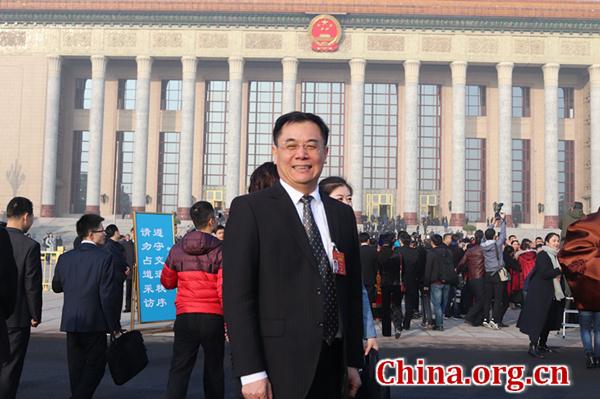NPC deputy suggests upgrading of Internet Plus healthcare
- By Zhang Liying
 0 Comment(s)
0 Comment(s) Print
Print E-mail China.org.cn, March 6, 2019
E-mail China.org.cn, March 6, 2019
China needs to step up efforts in infrastructure, technology, talent training, regulation and policy support to promote the upgrading of Internet Plus healthcare, a field where the country has already witnessed a good start, Mao Zongfu, a deputy to the 13th National People's Congress (NPC), said on Monday.

More advanced information technologies (IT) and network infrastructure are needed to underpin the sustainable development of Internet Plus healthcare, in which huge amounts of images and videos are transmitted, he told China.org.cn in an exclusive interview.
Mao, director of the Global Health Institute at Wuhan University, emphasized the role of talent in advancing the initiative, suggesting the country nurture more interdisciplinary personnel and professional teams well-versed in both IT and healthcare service.
Internet Plus healthcare, a new form of service in the sector, faces potential problems in such areas as ethics and financing, requiring more regulatory and support policies, he added.
Internet Plus healthcare had the power to transform the model of medical services by shifting the focus from medical institutions to patients, he stressed.
With the application of the telemedicine system, patients can consult doctors online in a timelier manner without having to go to hospital, thus achieving real patient-centered care.
Mao said that the development of Internet Plus healthcare, which requires new technologies and products, such as big data storage and devices worn on the body, will boost the upgrading of China's manufacturing and speed up the transformation of various growth drivers.
The State Council issued a guideline on Internet Plus healthcare last April to enhance healthcare management, optimize resource distribution, increase the efficiency of medical services and meet the increasing demand for quality healthcare.
However, Mao pointed out that the practices of integrating internet use into medical services have been implemented for years in China, and the country is among the world leaders both in breadth and depth.
He said that integrated healthcare service now covers almost the whole process of treatment from reservation, consultation to test result inquiry and medicine sales, and interconnection is achieved among medical institutions at all levels of China's three-tier hospital system.
The country's rapid development of internet-related technologies and services provides sound foundation for Internet Plus healthcare.
Mao also said that another impetus for following this road was the need to alleviate the problem of unbalanced distribution of medical resources.
Following the central government's guidelines, many local medical authorities have introduced measures to expand the space and content of healthcare service with the help of the internet.
For example, Guangdong province has equipped people in more than 2,000 poor villages with healthcare wearables and the "AI doctor," a healthcare app, which allow them to enjoy quality medical resources in the provincial capital.
Mao said development of Internet Plus healthcare is still at the initial stage globally, so it was important for China to collect and improve successful local practices that can be applied to the whole country or even other parts of the world.
This year's government work report, delivered by Chinese Premier Li Keqiang on Tuesday, proposed plans related to Internet Plus healthcare, saying China would "speed up efforts to pursue Internet Plus initiatives in all industries and sectors" and "upgrade networks for distance education and telemedicine."





